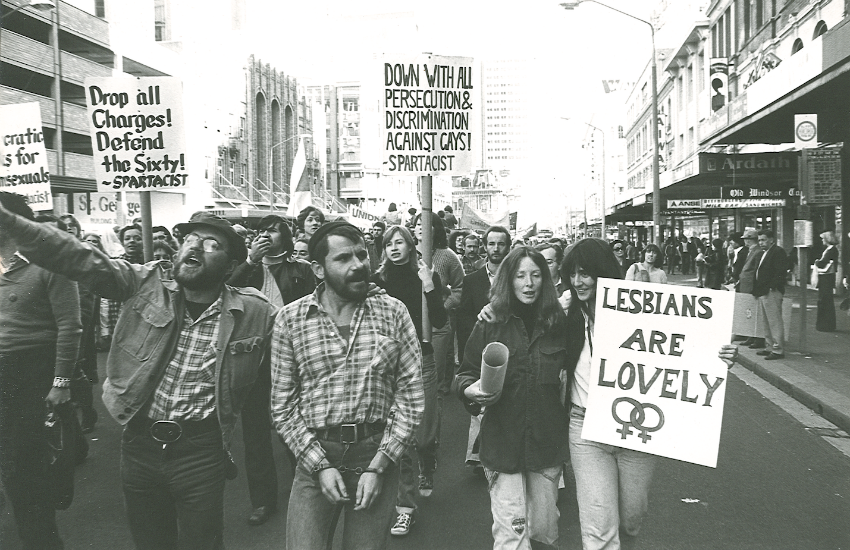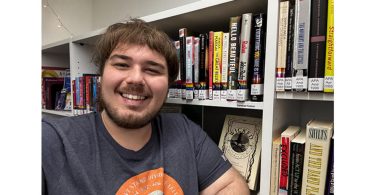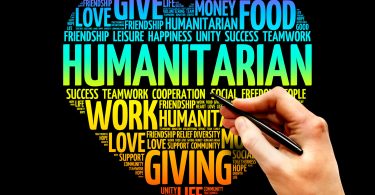The Sydney Mardi Gras has come a long way in its 40-year history, say its original rioters.
It was a dangerous time for LGBTI people living in Australia in 1978 when the first riot happened.
Homosexuality was still illegal in all states except South Australia. This meant anti-discrimination laws didn’t exist, so being openly LGBTI was a dangerous act of defiance.
Blood flowed and rioters protested as corrupt police removed their badges so they couldn’t be identified before they beat up LGBTI people.
‘This was state ordered, jackboot enforcement of oppression,’ Titi Chartay, 62, told Gay Star News. ‘Corrupt and ugly.’
Photo: Australian Lesbian and Gay Archives
Titi is originally from the Netherlands but lived in Melbourne as an out queer lesbian at the time of the riot. She came to Sydney for the protest and had already been arrested three times that year for her activism.
‘There was a joyous and festive air on the night of Mardi Gras,’ she said. ‘But once we got to Hyde Park where the parade had been planned to end, the police moved in. They tried to arrest Lance Gowland, who was driving the ute [utility vehicle] with the sound system.
‘The cops dragged Lance from the ute but with the aid of the crowd, he broke free. Then a cop went into the ute and began to drive it away.
‘I leapt onto the bonnet and some other dykes crowded around as well. We stopped it for a while,’ she said.
‘I thought I was going to die’
The rioters then moved towards Kings Cross where ‘things got ugly,’ according to Titi.
She added: ‘It was a maelstrom of unleashed brutality from the cops and blood flowed. Many people were injured, some seriously.’
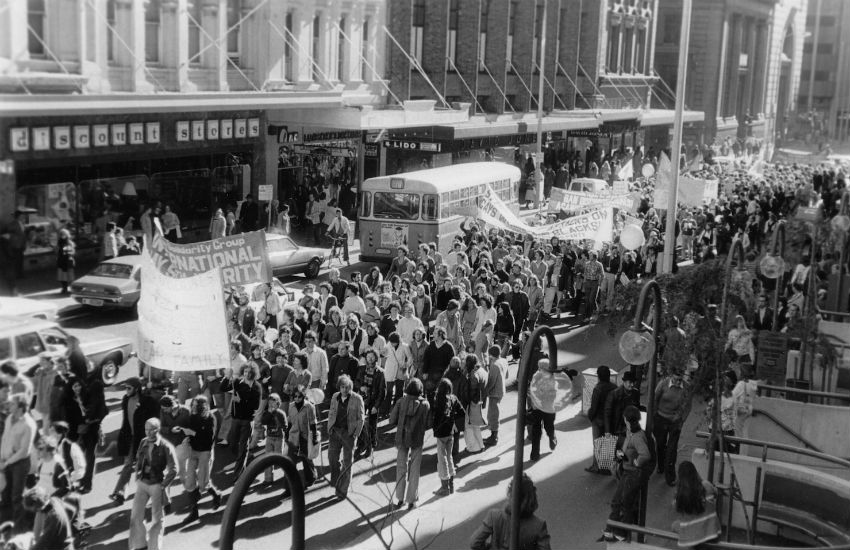
Photo: Australian Lesbian and Gay Archives
Peter Murphy, 64, was also present that evening and helped to promote the first ever Mardi Gras.
He said: ‘It was specifically meant to be a street party, not a protest. [It] was to commence at 10.30pm at night in the gay bar area at that time.’
He arrived to the protest late, but said: ‘It was much bigger than any protest march we had organized up to that point.
‘It was happy and exuberant, though it ended in that horrible police attack on us in Kings Cross,’ he said.
Police arrested him, along with several others that evening.
[embedded content]
He said in a video: ‘I stood up [in the back of the police car] and a policeman immediately punched me straight in the forehead.’
They were trying to escape and two of them actually did, but Peter didn’t manage to get out.
‘It was a lot of adrenaline,’ he said in an interview. ‘Looking back, I was very aware it could go bad.’
When they arrived at Darlinghurst police station, Peter was singled out. Two police officers dragged him into the station and threw him into a cell. One of the police officers bashed him countless times in the head and yelled abuse at him.
He started having convulsions as the physical attack escalated.
‘I thought I was going to die,’ he said. ‘The Darlinghurst police were notorious for violence.’
Titi said: ‘The irony is that this state sanctioned violence was a watershed moment that ensured Mardi Gras would continue.’
Rioters reflect on Sydney Mardi Gras today
Peter was injured so badly, he moved out of Sydney and could not take part in any marches for the following years.
He came back in 1986 and began attending Mardi Gras as both a reporter and spectator, then marched in the 20th anniversary parade.
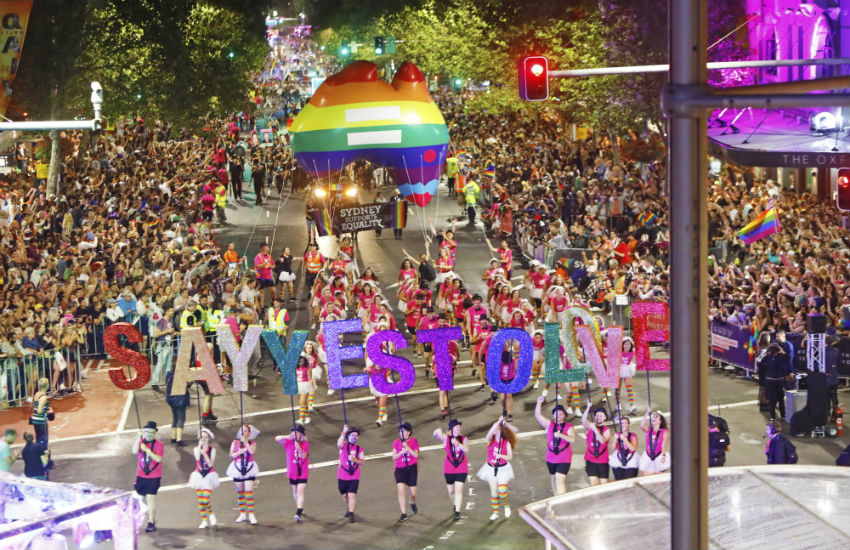
Photo: Ann-Marie Calihanna
Over the years, Titi marched with ACT Up, ACON, Positive Life and Leather Pride. She’s also the president of Leather Pride.
They’re both marching with the other 1978ers in this year’s 40th anniversary march at the front of the parade, right behind the first nation’s float.
Being outspoken and visible in society helped dispel stigma, which led to nationwide decriminalization of homosexuality, anti-discrimination laws and eventually marriage equality last year.
‘A lot can happen in 40 years,’ Titi said. ‘Yet too many struggles remain even in Australia.’
Peter said: ‘In the years after, we had the terrifying AIDS epidemic and so many people died.
‘Mardi Gras turned into a huge statement by our community of the need to care for those with AIDS, for safe sex, and to celebrate our community solidarity.
‘Mardi Gras became huge and played an immeasurable role in defusing any effort to isolate LGBTQI people from the national effort to address the Aids epidemic,’ he said.
‘There is still fiery protest’
Both Peter and Titi see the increasing commercialization of Mardi Gras over the years. But they say it hasn’t lost its heart of being about activism.
Titi said: ‘At its core, the energy and creativity that drives Mardi Gras still comes from the community.
‘Due to Mardi Gras’s size now, street spontaneity may have been lost but there is still fiery protest, pungent satire, the celebration of our diversity and our solidarity [and] the presence of those who support us,’ she said.
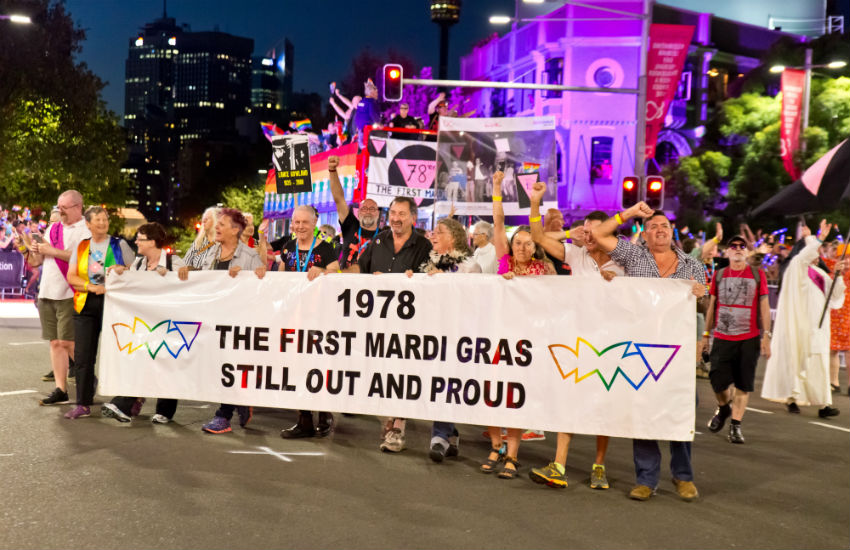
Mardi Gras 2016. | Photo: Sydney Mardi Gras
Peter said winning marriage equality at the end of last year was a huge achievement but there’s still more work to do.
He said: ‘Now we have won that battle we have a lot to celebrate this year, and many allies to act in solidarity with in coming years.’
Titi added: ‘Overseas, too many of us are still dying from hatred and violence. With countries like Russia, Chechnya, Kazakhstan, Indonesia, Saudi Arabia, Iran, Nigeria – the list goes on. [They’re] repressing, attacking, imprisoning, raping, torturing and murdering our LGBTI family.
‘It remains vital that we protest vehemently against these ongoing human rights abuses and atrocities. The parade is a now a brightly visible venue to highlight these egregious injustices,’ she said.
And as for the next 40 years, Titi said: ‘It is incumbent upon everyone to ensure that Mardi Gras remains community driven, politically outrageous and socially responsive if it is to retain its vitality, validity and relevance.’

